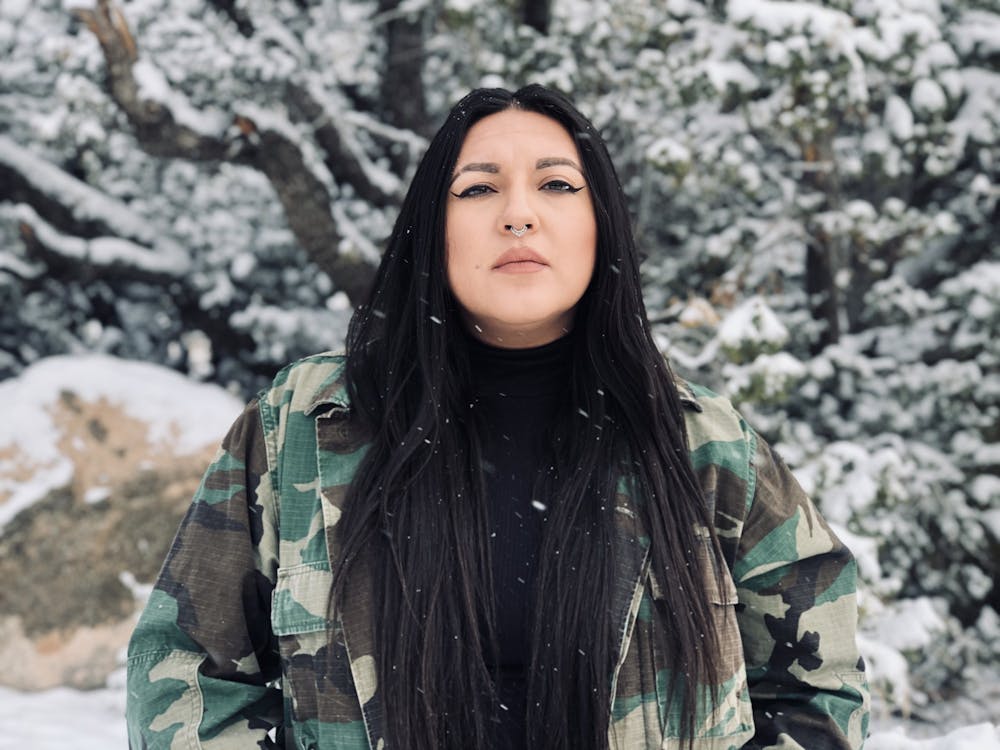With a fierce passion for amplifying Indigenous worldviews in climate change issues, Julia Bernal is a graduate student pursuing degrees in community and regional planning and water resources at the University of New Mexico. She works to assert diverse perspectives through water management in New Mexico.
Bernal, an enrolled member of the Sandia Pueblo, has been a steadfast contributor to efforts concerning the oil and gas drilling in the greater Chaco Canyon landscape, which has been a key focus in her work with the Pueblo Action Alliance. She said her graduate studies at UNM will help give her “some credibility in this attempt to merge grassroots efforts to water management and water planning.”
“Something needs to change drastically, and now, otherwise we’re going to continue experiencing climate chaos and that is completely unfair to young people who didn’t consent to oil and gas, didn’t consent to these capitalist systems that consolidate wealth, didn’t consent to oppression,” Bernal said.
Water management and planning practices need to include Indigenous perspectives, which Bernal is actively working toward, according to Lani Tsinnajinnie, Bernal’s academic advisor and assistant professor of community and regional planning.
“Indigenous people have been managing water since time immemorial,” Bernal said. “I’m not making up theory. I’m speaking to lived experiences and ancestral ecological knowledge.”
Tsinnajinnie met Bernal at a 2016 lecture series and was capitativated by her work on the Dakota Access pipeline protests on the Standing Rock Sioux Tribe reservation. She said she knew Bernal would be an excellent addition to the community and regional planning program “not just because of what the program could offer her but what she could offer to UNM as well.”
“For her thesis, Julia is examining the pueblo feminist perspective on water management with the particular context on water management in the Middle Rio Grande,” Tsinnajinnie said. “She’s examining the participation of pueblo women in water management decisions.”
Bernal said she hopes to encourage and make space for ongoing discussions between Indigenous communities about their collective water concerns through stakeholdership and participation. She said diversifying who’s participating in these conversations to include Indigenous people, especially women and nonbinary individuals, will offer important and creative solutions on how to manage water in accordance with climate change.
“I really hope that my work can bring people together in spaces to think very deeply about what it means to decolonize water,” Bernal said. “Not the co-opted version of what decolonizing is; I mean really removing European perspectives and occupations and a resurgence of Indigenous worldviews. It’s this work that shifts paradigms.”
Bernal said she feels strongly about asserting pueblo Indigenous perspectives when addressing water arrangements and policy. Her work with the Pueblo Action Alliance gives her a space to have important conversations and pursue action on these efforts, and she said that it’s critical to consider the disruptive social implications of climate change for already vulnerable communities.
“Water security and abundance has always been an issue in this region, but even more so as temperatures are rising, as more and more people are moving to New Mexico and population is increasing, we’re seeing more and more stressors to the natural world,” Bernal said. “It’s all done under this dominant, Western paradigm that doesn’t exactly coincide with Indigenous worldview.”
Get content from The Daily Lobo delivered to your inbox
Bernal said Indigenous senior water rights, which protect ancestral lands, give “political leverage to exercise our sovereignty on how water is being allocated throughout the region.”
“We may not even see water running through this area in the future which is a cultural threat because water is very integrated into our culture here in Sandia (Pueblo),” Bernal said.
Bernal said water issues are technical and complex, with focuses ranging from hydrology to natural resources, and policy to environmental planning. Though Bernal didn’t have a science education background prior to beginning her graduate studies, Tsinnajinnie has helped her navigate technical water concepts. She said it's important to have people whose work is to make this information accessible to those with general knowledge.
“If Indigenous students understand and realize and know that colonization is the root cause of a lot of our issues and other non-Indigenous students don’t, it puts the burden on Indigenous students to have to teach people what colonization is,” Bernal said.
Bernal has often been put in the position of having to educate non-Indigenous students on what colonization is, even though that history is so significant and connects to many ongoing environmental issues.
“I hope that the University continues to assert themselves as an institution that grounds itself in social and environmental justice, especially since the University is sitting on the ancestral lands of the Tiwa people, and continues educating their students on issues around colonization,” Bernal said.
Rebecca Hobart is a senior reporter at the Daily Lobo. She can be contacted at culture@dailylobo.com or on Twitter @rjhobart






